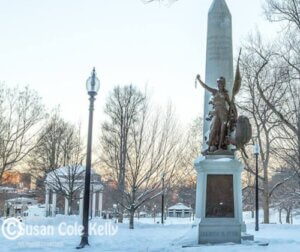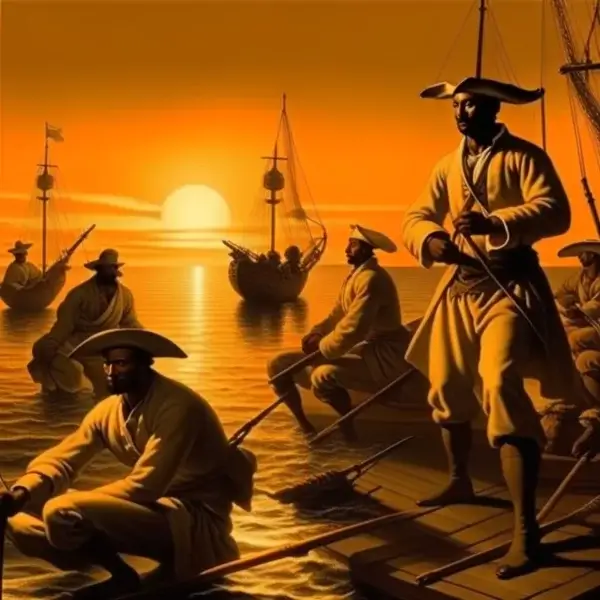Born in 1723 in Framingham, Massachusetts, Crispus Attucks had an African father named Prince and a Native American mother named Nancy from the Natick Tribe.
Well before Crispus and his sister Phoebe were born, their father was kidnapped and sold into American slavery. At the age of 16, Crispus went through a heart-wrenching separation, torn away from his family and sold to a new slave owner.
Breaking Free: Crispus’ Journey to Self-Liberation
In 1750, at age twenty-seven, Crispus looked across the bustling Boston Harbor, where ships gracefully glided into and out of the shipping docks. Crispus felt an undeniable yearning to embrace the life of a sailor. Breaking free from the oppressive shackles of slavery, he embarked on a profound journey of self-liberation.
Driven by a strong will, his choice to work as a sailor further encouraged him to pursue the role of whaler. this extra responsibility pushed him onto the expansive and sometimes rough high seas, where, for the next two decades, he fearlessly faced nature’s challenges—capturing majestic whales amidst foggy, windy, and stormy conditions.
Tragedy Strikes: Crispus in the Boston Massacre
The sun dipped below the horizon on the evening of March 5, 1770, a fierce argument erupted between colonists and soldiers. Bells rang loudly, and lots of people hurried into the streets.
Crispus Attucks and about twenty of his sailor friends joined the colonists. When Crispus and his friends got there, the colonists were throwing objects and snowballs. The tension was escalating like a brewing storm.
In this chaos, Crispus Attucks found himself entangled in a scuffle with a British soldier. Suddenly, two gunshot wounds pierced Crispus Attucks’ chest, killing him instantly, at 47. Shortly thereafter, as other soldiers discharged their weapons, four other men lost their lives. The events of this evening became known as the Boston Massacre.
Courtroom Drama: British Soldiers and John Adams
Eight months later, on November 27, 1770, several British soldiers boldly appeared inside a Boston Courthouse, for the murder of Crispus Attucks and other men. However, the courtroom proceedings took a shocking turn when John Adams, the future 2nd President of the U.S., stepped forward to defend the British soldiers.
Justification for Lethal Force: Adams’ Controversial Defense
Adams documented his argument, portraying Crispus Attucks as a “stout mulatto fellow,” suggesting his appearance was terrifying. With disbelief, Adams questioned what soldiers could do when faced with such a menacing figure.
To the shock of many, Adams went on to contend that Attucks, in a supposed fit of madness, had the audacity and strength to engage with a bayonet. He further claimed that the soldier involved was justified in using lethal force, citing a perceived fear for his life.
In a series of statements marked by surprise and disappointment, Adams effectively exonerated the soldiers, providing a guarantee of their innocence in the death of Crispus Attucks.
Hero or Intruder: Crispus Attucks’ Dilemma
Questions arise about Crispus Attucks’ heroism as a runaway slave. Some debate if he got involved in a situation beyond his circumstances. His decision to engage in the conflict sparks inquiries into his motivations and the complex circumstances of the time.

Legacy Unveiled: Crispus Beyond the Massacre
Crispus Attucks’ legacy extends beyond the Boston Massacre. His refusal to “walk the other way” played a pivotal role in shaping the courage of white colonists. Mr. Attucks’ bravery led directly to the declaration of the American Revolutionary War in 1775, which is often overshadowed by John Adams’ credited leadership.
Unseen Chapters: Crispus Attucks in History Books
Reflecting on Crispus Attucks’ story, it’s worth asking some serious questions. Was he a martyr? Did he show bravery, or did he and his friends get involved in something, not their concern? As a runaway slave, he lived in constant fear, knowing any misstep could lead to a life of torture or worse.
Digging deeper, we start to wonder about the reasons behind his choice. Some in the black community might argue it wasn’t really his fight. The questions linger: Why didn’t he opt for safety indoors or walk away from the brewing conflict? Calmly exploring these thoughts, it raises a serious, yet curious discussion about the complex layers of Crispus Attucks’ role in history.
Works Cited The Trial of the British Soldiers of the 29th Regiment of Foot. Massachusetts (colony) Courts. Boston: 27 November 1770. Court Document.
Discover More https://natickprayingindians.org/history.html

